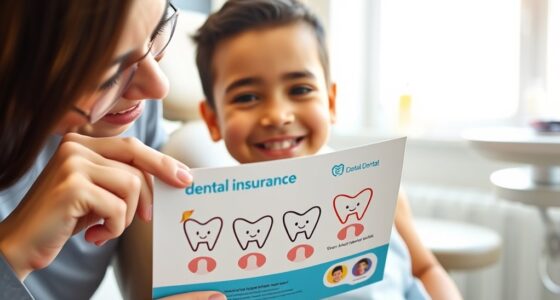Providing dental care for children with special needs involves creating a calming, supportive environment tailored to their unique physical, behavioral, and developmental needs. Personalized treatment plans, gentle techniques, and adaptive tools help make dental visits less stressful and more effective. Supporting oral hygiene at home through engaging routines and regular professional care is key. By understanding these approaches, you can help promote healthier smiles and positive experiences—discover more tips to care for your child’s oral health.
Key Takeaways
- Provide specialized dental environments with calming techniques and adaptive equipment to reduce anxiety for children with special needs.
- Develop personalized treatment plans considering medical conditions, developmental stages, and sensory sensitivities.
- Use behavior guidance strategies, visual aids, and positive reinforcement to encourage oral hygiene and dental cooperation.
- Incorporate adaptive tools like electric toothbrushes and mouth props to improve at-home oral care routines.
- Foster ongoing education and communication with caregivers to ensure long-term oral health maintenance and preventive care.
Understanding the Importance of Specialized Dental Care

Understanding the importance of specialized dental care is essential because children with special needs face unique physical, behavioral, and developmental challenges that standard dental treatments may not address effectively.
Special needs dental care offers personalized treatment plans tailored to each child’s medical conditions, medications, and developmental stage. Adaptive adjustments, like sensory-friendly lighting and specialized equipment, help improve dental comfort and reduce anxiety. Additionally, incorporating specialized equipment designed for comfort and accessibility can significantly enhance treatment outcomes. These adaptations often include modified dental tools that accommodate various physical limitations, ensuring more effective care.
Incorporating high-quality equipment and techniques ensures that treatments are safe, efficient, and tailored to individual needs. Additionally, training staff in specialized techniques enhances their ability to provide compassionate and effective care for these children.
These specialized dental services aim to enhance oral health outcomes by preventing common issues such as cavities, gum disease, and malocclusions that often go unnoticed in children with complex health needs.
Considering behavioral considerations and developmental challenges ensures that every visit is safe, effective, and less stressful, making preventive dental care more accessible and successful for children with special needs.
Creating a Comfortable and Stress-Free Environment

Creating a comfortable and stress-free environment is essential for ensuring children with special needs feel safe and relaxed during dental visits. To achieve this, you can implement a calming environment by using specialized equipment, dimmed lighting, and reduced sound levels to accommodate sensory sensitivities. Incorporate behavior guidance techniques like positive reinforcement and desensitization to help build trust and reduce anxiety. Stress-free procedures, including sedation options, drill-free, and shot-free treatments, make visits more manageable. A child-friendly office with familiar toys and friendly staff creates positive associations with dental care. Additionally, providing personalized attention and extra staff support ensures each child’s unique needs are met, fostering a relaxed atmosphere that encourages cooperation and comfort throughout the appointment. Incorporating sensory considerations into the environment can further enhance comfort for children with sensory sensitivities. Understanding the importance of calming techniques can help in developing effective strategies to ease anxiety during visits. Moreover, training staff in behavior management can significantly improve the overall experience for children and their families. Recognizing the role of specialized training for dental professionals can also contribute to more effective and compassionate care. Regularly updating staff on the latest child-centered approaches ensures that care remains empathetic and responsive to each child’s needs.
Developing Personalized Treatment Strategies

Developing personalized treatment strategies is vital to effectively meet the unique needs of children with special needs. You start by evaluating their medical history, developmental stage, and behavioral preferences to create a tailored approach.
Creating individualized treatment plans is essential to address each child’s unique needs effectively.
Personalized treatment ensures that each child’s specific sensory sensitivities are considered, and customized care plans incorporate necessary modifications, such as sedation, desensitization, or specialized equipment.
Collaborating with caregivers and healthcare providers helps align the treatment with the child’s overall health goals and medication considerations.
Regular evaluation and adjustment of these strategies are essential as children’s developmental and medical conditions evolve.
Managing Medical Conditions and Nutrition Impact

Addressing the medical conditions and nutritional factors affecting children with special needs is key to maintaining their oral health. Medical conditions, such as medication use and saliva production issues, can increase cavity risk by reducing natural cleansing and promoting dental decay. Incorporating juice tips and tricks can also support hydration and nutritional balance, indirectly benefiting oral health.
Nutritional impact, including limited ability to chew and insufficient calcium intake, affects enamel strength and jaw development. Conditions like teeth grinding or food pouching may also cause dental wear if not managed properly. Additionally, understanding factors influencing oral health can provide valuable insights into supporting these children’s overall well-being.
To support oral health, focus on:
- Managing medical treatments that influence saliva flow and enamel integrity
- Providing tailored dietary plans that ensure adequate calcium and balanced nutrition
- Implementing behavior management strategies to minimize harmful habits
- Understanding foreign exchange and currency fluctuations can help in planning for expenses related to healthcare and treatment abroad.
- Incorporating preventive dental care such as sealants and fluoride treatments to further reduce decay risk.
Regular dental monitoring is essential to address these factors and reduce the risk of dental decay in children with special needs.
Supporting Oral Hygiene at Home

Supporting oral hygiene at home is essential for children with special needs to maintain healthy teeth and gums. Establish a consistent brushing routine, using visual aids or rewards to motivate children and make oral care engaging. Incorporating regular check-ups can help identify potential issues early and reinforce good habits. Adaptive tools like electric toothbrushes, floss holders, and mouth props can help facilitate effective techniques suited to your child’s developmental needs. Always supervise and assist during brushing to ensure proper technique and prevent swallowing toothpaste. Proper technique is crucial for effective cleaning and minimizing discomfort for children with special needs. Engaging children in fun activities such as singing or games can encourage longer brushing sessions and make the process enjoyable. Regular communication with dental professionals allows you to tailor at-home care to your child’s unique medical and developmental needs. Staying informed about AI security can help ensure that digital tools used for your child’s care remain safe and reliable, providing peace of mind for caregivers. Additionally, understanding newborn safety guidelines can help you create a secure environment that supports overall health and well-being. Incorporating educational toys into daily routines can also motivate children to participate in their oral hygiene practices more willingly. Prioritizing effective techniques and adaptive tools ensures prime oral health and a positive experience for your child.
Frequently Asked Questions
How Do Autistic Kids Go to the Dentist?
When you take your autistic child to the dentist, you’ll want to prepare them first. Use visual supports, social stories, and familiar routines to help them understand what to expect.
The dental team may use desensitization and behavior guidance techniques to make the visit comfortable. They might also use sedation or drill-free procedures to reduce discomfort.
With a caring, trained team, your child can have a positive, less stressful dental experience.
What Is the Rule of 7 in Pediatric Dentistry?
The Rule of 7 in pediatric dentistry states that you should take your child for their first dental visit by age 7 or within six months after their first tooth erupts.
This approach helps you establish a dental home early, allowing for preventative care, monitoring tooth development, and catching any issues early.
Regular visits promote good oral hygiene habits and reduce the risk of cavities and dental problems as your child grows.
What Are the Oral Conditions in Children With Special Needs?
You should know that children with special needs often face various oral conditions. These include an increased risk of cavities, gum disease, and enamel defects due to their medical conditions and medications.
They may also experience malocclusion, delayed eruption, or abnormal jaw development. Sensory issues can cause oral sensitivities, making hygiene challenging.
Additionally, dry mouth from medications raises the risk of infections, and functional problems like difficulty chewing or swallowing can impact their oral health.
Does Disability Cover Dental Work?
You might wonder if disability benefits cover dental work. Generally, they do, but it depends on your specific plan.
Federal programs like Medicaid and CHIP usually include dental coverage for children with disabilities, covering treatments like repairs, extractions, and orthodontics if necessary.
Private insurance may have limited coverage or require extra riders. Check your policy details or talk to your provider to understand what’s included and verify your child’s dental needs are met.
Conclusion
You can make a difference by understanding their unique needs, creating a calming environment, developing tailored plans, managing health and nutrition, and supporting daily oral hygiene. By staying informed, being patient, and offering consistent care, you guarantee their smiles stay healthy and bright. Your dedication fosters confidence, comfort, and trust. Remember, your proactive approach transforms challenges into opportunities, making every visit positive. Together, you and your child can enjoy a lifetime of healthy, happy smiles.









